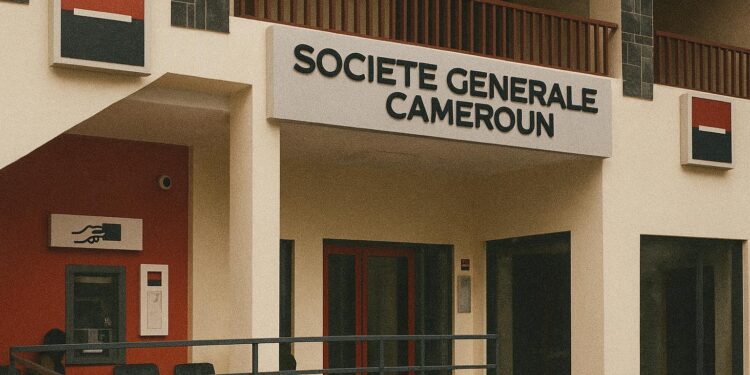Paris retrenches as Yaoundé reconfigures shareholding
Société Générale’s strategic downsizing in sub-Saharan Africa, confirmed in successive communiqués from Paris and echoed by financial wires (Reuters 2025), has left Yaoundé with an 83.68 percent holding in Société Générale Cameroun. The Cameroonian Treasury acquired the block in mid-July, portraying the move as a temporary stewardship while a new “anchor investor” is identified. That invitation has triggered a discreet but intense contest among three regional heavyweights determined to inherit one of Central Africa’s most profitable balance sheets.
BGFIBank leverages Franc Zone pedigree
The Libreville-based BGFIBank, already operating 10 branches in Cameroon, has cultivated a reputation for swift execution in cross-border acquisitions. Its chairman Henri-Claude Oyima publicly framed external growth as a “natural extension of our pan-African vocation” during the group’s annual results presentation (Jeune Afrique 2024). The bank’s successful absorption of Société Générale Congo last year—completed in concert with Brazzaville’s authorities—offers a living template for regulatory migration, IT harmonisation and human-resources continuity. Yaoundé’s policymakers, mindful of BGFIBank’s proven capacity to protect local employment while maintaining compliance with the Communauté Économique et Monétaire de l’Afrique Centrale (CEMAC) rulebook, view the bid with measured sympathy.
NSIA Banque courts CEMAC diversification
NSIA Banque, the Ivorian financial arm of Jean Kacou Diagou’s insurance-banking conglomerate, approaches the dossier from a different angle. Already implanted in Côte d’Ivoire, Guinea and Benin, the group seeks a strategic bridgehead into the CEMAC zone to complement its West African Monetary Union portfolio. According to banking sources in Abidjan (Africa Intelligence 2025), Diagou met Finance Minister Louis Paul Motaze in Yaoundé in June to pitch a partnership model that would retain a minority public share for Cameroon while offering cross-channel bancassurance products. Such a structure could bolster medium-term fiscal receipts through dividends and taxes without undermining sovereign influence over a systemic institution.
Zenith Bank signals Anglophone appetite
Zenith Bank’s overture carries different geopolitical overtones. Lagos-listed and London-quoted, Zenith embodies the ambitions of Nigeria’s Tier-1 lenders to scale beyond a saturated domestic market. Chief Executive Ebenezer Onyeagwu recently told analysts that “Cameroon offers a natural continuum for our Anglophone client segment” (Financial Times 2025). By courting Société Générale Cameroun, Zenith would secure instant access to roughly 400,000 retail accounts and a corporate franchise anchored in the oil-services corridor from Douala to Kribi. For Cameroonian authorities, the Nigerian suitor provides a potential hedge against over-dependence on Franc Zone liquidity, though currency-clearing mechanics under the CFA peg would require meticulous alignment.
Regulatory calibrations and regional prudence
The central bank in Yaoundé, BEAC, has signalled that any transaction must respect Basel III thresholds on capital adequacy and anti-money-laundering protocols already embedded in regional jurisprudence. Officials privately concede that BGFIBank, as an incumbent, enjoys a head start in documentation readiness, yet they emphasise a level playing field. Observers recall that the 2023 takeover of Banque Internationale du Congo unfolded with presidential assent in Brazzaville and seamless approval from COBAC, offering a precedent that reassured markets without unsettling depositor psychology. The same governance choreography is likely to guide Cameroon’s timetable, with due diligence windows running into early 2026.
Potential macroeconomic dividends for Cameroon
Economic planners at the Ministry of Economy envisage that a well-capitalised acquirer could unlock a cascade of syndicated lending for infrastructure—particularly in transport corridors linking Cameroon’s ports to landlocked Chad and the Central African Republic. Scenario modelling circulated within government suggests that a fresh $250 million capital injection could lift private-sector credit growth by two percentage points annually, supporting import-substitution schemes in agribusiness while preserving external reserves. The prospect of introducing innovative digital platforms, whether Zenith’s mobile wallet or NSIA’s bancassurance algorithms, is likewise framed as a lever for financial inclusion in rural departments.
Measured optimism among depositors and investors
Local chambers of commerce voice cautious optimism. “What matters is that the incoming shareholder maintains the bank’s trade-finance expertise and SWIFT connectivity,” remarks Gwendoline Tchala, vice-chair of the Cameroon Employers’ Union. Market sentiment on the Douala Stock Exchange, thin though it is, has been buoyed by speculative purchases of banking sector notes, while sovereign bond spreads narrowed five basis points after the July announcement. In a region where confidence can be fragile, the state’s transparent tender process and the calibre of bidders constitute, in the words of a senior BEAC official, “a textbook case of orderly transition”.












































